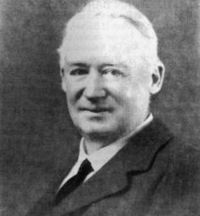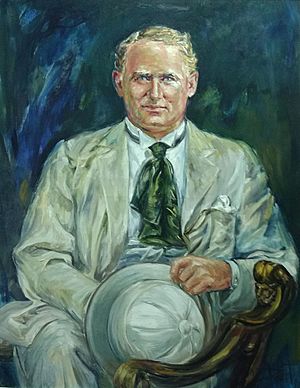James Percy FitzPatrick facts for kids
Quick facts for kids
Sir Percy FitzPatrick
|
|
|---|---|

Sir Percy FitzPatrick
|
|
| Born | 24 July 1862 King William's Town, Cape Colony |
| Died | 24 January 1931 (aged 68) Amanzi, Uitenhage, Union of South Africa |
| Pen name | Percy FitzPatrick |
| Occupation | Author, politician, mining financier, farmer |
| Nationality | South African |
| Period | 1907–1931 |
| Genre | Non-fiction |
| Subject | South Africa |
Sir James Percy FitzPatrick (born July 24, 1862 – died January 24, 1931), known as Percy FitzPatrick, was an important South African writer, politician, and businessman. He is most famous for writing the classic children's book, Jock of the Bushveld (1907). This book tells the adventures of his brave dog, Jock. FitzPatrick also played a key role in South African politics. He helped create the two minute silence observed on Armistice Day to remember those who died in wars.
Contents
Early Life and Family
Percy FitzPatrick was born in King William's Town, South Africa. He was the oldest son of James Coleman FitzPatrick, a judge from Ireland. His mother, Jenny FitzGerald, was also from Ireland. Sadly, two of Percy's younger brothers died in conflicts. Thomas was killed during the Matabele Rebellion. George died fighting for the British in the Second Boer War.
Education and Early Career
Percy FitzPatrick first went to school at Downside School in England. Later, he studied at St. Aidan's College in Grahamstown, South Africa. After his father passed away in 1880, Percy left college to help support his family. He worked as a clerk in a bank in Cape Town.
In 1884, he moved to the goldfields in the Eastern Transvaal. There, he had many different jobs. He worked as a storeman and helped prospectors search for gold. He also became a journalist and a transport-rider, using ox-wagons to move goods. Later, he became the editor of the Gold Fields News newspaper.
Writing Jock of the Bushveld
Percy FitzPatrick's adventures during his time in the Transvaal goldfields inspired his most famous book. This book, Jock of the Bushveld, was published in 1907. It tells the true story of his loyal and brave dog, Jock. The book became a beloved classic for children and adults alike. It shares exciting tales of life in the African bush.
Political Involvement
FitzPatrick also wrote another important book called The Transvaal from Within. This book described the problems faced by English-speaking people in the South African Republic. It greatly influenced public opinion in Britain before the Second Boer War.
In 1892, FitzPatrick became a leader in a large mining company in Johannesburg. He later became the secretary of the Reform Committee in 1895. This group planned to overthrow the government of Paul Kruger in the South African Republic. FitzPatrick helped connect this committee with other important figures like Cecil Rhodes. The plan failed, and FitzPatrick was arrested. He was released in May 1896.
When the Anglo-Boer War began in 1899, FitzPatrick helped create the Imperial Light Horse Regiment. Because of poor health, he could not fight. Instead, he stayed in Britain and advised the British Government on South African matters. For his service, Percy FitzPatrick was knighted in 1902. He later received another high honor, becoming a Knight Commander of the Order of St Michael and St George.
Forming the Union of South Africa
FitzPatrick was one of eight representatives from the Transvaal in the National Convention (1908–1909). This important meeting brought together four British colonies in South Africa. They worked to combine them into one country, the Union of South Africa.
He then served as a member of the parliament for the new Union of South Africa. He successfully kept his seat in elections in 1906 and 1910. FitzPatrick also worked with General J.B.M. Hertzog to make English and Dutch the official languages of the Union.
Other Contributions
Percy FitzPatrick had a love for animals. He kept wild animals he brought back from hunting trips at a place that is now Zoo Lake in Johannesburg. Some of these animals became the first residents of the Johannesburg Zoo. He also helped start citrus farming in South Africa, which became a major industry.
The Two-Minute Silence
One of Percy FitzPatrick's most lasting ideas is the two-minute silence on Armistice Day. On October 27, 1919, he suggested to King George V that people should observe a moment of silence each year. This would honor those who died in World War I.
On November 7, 1919, the King agreed. He announced that at the 11th hour of the 11th day of the 11th month, there would be two minutes of complete silence. This was so everyone could remember the brave soldiers who died. November 11, 1918, was the day World War I officially ended. Lord Stamfordham, the King's Private Secretary, thanked FitzPatrick for his idea. He wrote that the King "ever gratefully remembers that the idea of the Two Minute Pause on Armistice Day was due to your initiation."
Family and Legacy
Percy FitzPatrick married Elizabeth Lilian Cubitt in 1886. They had four children: Percy, Alan, Oliver, and Cecily. Their oldest son, Major Percy Nugent Fitzpatrick, was killed in France during World War I in 1917.
Sir James Percy FitzPatrick passed away in 1931 at the age of 68. He was buried at "The Look Out" near Uitenhage, a spot with beautiful views of the Sundays River Valley.
His legacy continues today. The Percy FitzPatrick Institute of African Ornithology was founded in 1959. This institute, at the University of Cape Town, studies African birds. It was started by his daughter, Cecily K. Niven. The Percy FitzPatrick Award was also created in 1970. It is given to the best South African children's book written in English.


